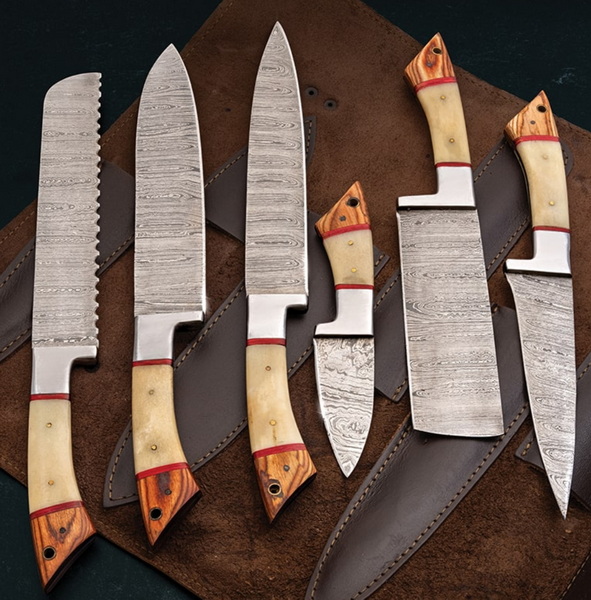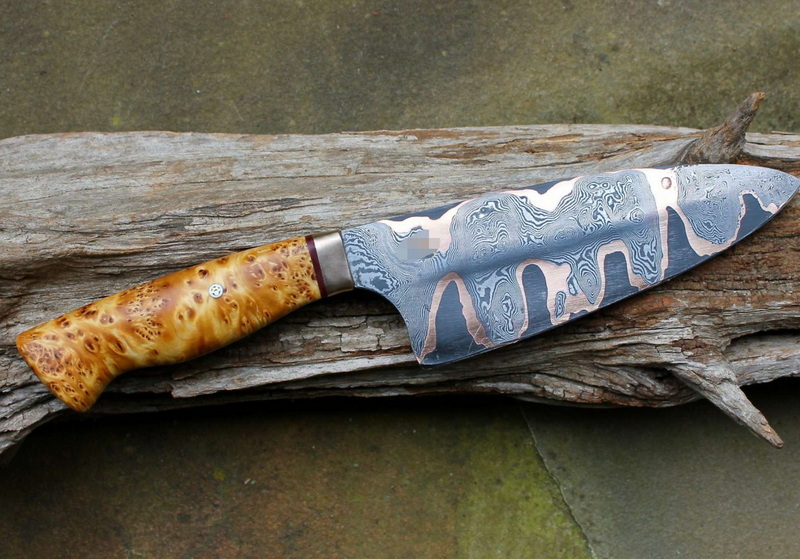- All
- Product Name
- Product Keyword
- Product Model
- Product Summary
- Product Description
- Multi Field Search
Views: 2220 Author: Ann Publish Time: 2025-10-18 Origin: Site











Content Menu
● Introduction: The Allure of Damascus Knives
>> The Science Behind the Damascus Pattern
● Benefits of Using a Handmade Damascus Knife in Your Kitchen
>> Exceptional Sharpness and Edge Retention
>> Superior Strength and Flexibility
>> Unique Beauty That Enhances Your Kitchen's Aesthetic
>> Corrosion Resistance and Durability
>> Comfortable Handle Designs for Ergonomic Use
● How Handmade Damascus Knives Compare to Other Kitchen Knives
● Choosing the Right Handmade Damascus Knife for Your Kitchen
>> Consider Your Primary Kitchen Uses
>> Check Blade Thickness and Length
>> Focus on Handle Comfort and Grip
>> Verify Authenticity and Handmade Craftsmanship
● Care and Maintenance of Handmade Damascus Knives
>> Regular Sharpening and Honing
>> Safe Storage
● Damascus Knives for Specific Culinary Uses
>> Why Professional Chefs Depend on Damascus Blades
>> Perfect for Home Cooking Enthusiasts
>> Specialty Damascus Knife Types
● Why Handmade Damascus Knives Make Stunning Gifts
● Frequently Asked Questions About Damascus Knives
>> 1. What makes a Damascus knife different from a regular kitchen knife?
>> 2. Are handmade Damascus knives worth the higher price?
>> 3. How do I maintain the edge of a Damascus knife?
>> 4. Can Damascus knives rust easily?
>> 5. Are Damascus knives suitable for professional chefs?
The kitchen is the heart of every home, and the tool in a chef's hand can truly elevate cooking. Among the vast array of kitchen knives available, there is one that stands out for its beauty, durability, and unparalleled performance—the handmade Damascus knife. Known for its signature swirling patterns and expert craftsmanship, a Damascus knife is more than just a blade; it is a culinary masterpiece.

A Damascus knife is made from multiple layers of steel forged together to create a strong, resilient blade with distinctive wavy patterns. This blade is traditionally made through a laborious process of forging and folding steel to combine hardness and flexibility. Handmade Damascus knives showcase incredible artistry, combining ancient metallurgical techniques with modern technology.
The iconic Damascus pattern results from combining layers of high-carbon and softer steels. This layering creates a blade that provides sharpness, durability, and rust resistance unmatched by common stainless steel knives. Each knife boasts unique patterns because the layering process varies with each forging—a true handcrafted work of art.
Thanks to the layered steel and careful forging, Damascus knives can hold a much sharper edge for longer durations, making cutting tasks easier and more efficient.
The layered construction balances hardness and flexibility, ensuring the blade won't easily chip, crack, or snap—ideal for professional chefs and home cooks who want reliability.
Every Damascus knife has a one-of-a-kind pattern making it a natural centerpiece on your kitchen countertop or knife block. These knives are not only tools but collectibles that showcase craftsmanship.
The forging process and the presence of high-quality steels help the knife resist corrosion and maintain performance over years of usage.
Handmade Damascus knives often come with handles crafted from premium materials like pakkawood, stabilized wood, or resin, ergonomically designed to provide a secure grip and reduce hand fatigue.
| Feature | Handmade Damascus Knife | Typical Stainless Steel Knife | Stamped Knife |
|---|---|---|---|
| Blade Material | Layered high and low carbon steels | Single stainless steel | Thin stamped stainless steel |
| Visual Pattern | Unique swirling Damascus patterns | Plain, polished surface | Plain |
| Edge Retention | Excellent, holds razor sharpness longer | Moderate | Lower, dulls quickly |
| Durability & Strength | High, flexible yet strong | Moderate rigidity | Prone to chipping |
| Corrosion Resistance | Superior, forged layering increases resistance | Good | Average |
| Price | Premium due to craftsmanship | Lower price | Low cost |
Select a Damascus chef knife for all-purpose cutting, a cleaver for chopping bones, or paring knives for delicate work depending on your culinary needs.
For versatile use, a 8 to 10-inch blade is ideal. Thinner blades are better for precision slicing, while thicker blades offer durability for heavy-duty tasks.
Opt for handles that feel balanced in your hand, made from high-quality materials with ergonomic design to ensure safety and comfort during extended use.
Ensure your Damascus knife is truly handmade using traditional forging techniques, not mass-produced stamped knockoffs. Authentic Damascus knives come from trusted manufacturers who combine artisan skill and strict quality controls.

Proper care increases the lifespan of any knife, and Damascus blades benefit significantly from mindful maintenance.
Always hand wash your Damascus knife with mild soap and warm water immediately after use. Avoid dishwashers which expose the blade to harsh detergents and water temperatures. Dry the blade thoroughly with a soft cloth to prevent moisture accumulation that can lead to surface oxidation.
Preserve the blade's edge by frequent honing with a ceramic rod to realign the cutting surface. When the blade dulls, sharpen it carefully with whetstones following the angle recommended by the manufacturer, typically around 15° to 20°. Avoid electric sharpeners, as they may wear down the delicate layers too aggressively.
Store your Damascus knives in knife blocks, on magnetic strips, or in protective sheaths to avoid dulling or damage. Avoid tossing them loosely in drawers where blades can get scratched or cause injury.
Use wooden or plastic cutting boards exclusively with Damascus knives. Hard surfaces like glass, granite, or metal cutting boards can chip or dull the blade prematurely.
Applying a thin layer of food-safe mineral oil on the blade once in a while helps maintain corrosion resistance and keeps the layered steel vibrant.
Professional kitchens demand sharp, fast, and reliable knives. Handmade Damascus knives provide the precision performance needed for intricate vegetable slicing, meat carving, and delicate filleting while enduring rigorous daily use.
Home cooks will appreciate the balance and smooth cutting action provided by Damascus knives, which can make meal prep faster and more enjoyable.
- Chef's Knife: Versatile all-rounder with 8-10 inch blade
- Santoku: Japanese-style variant favored for chopping and dicing
- Cleaver: Heavy blade for tough chopping and slicing of meat and bones
- Paring Knife: Small, precise knife for peeling and intricate cutting
- Utility Knife: Mid-sized for general kitchen tasks
Their elegance, combined with practicality, means a handmade Damascus knife is a cherished gift for culinary aficionados. High-end Damascus knives often come in beautiful packaging suitable for special occasions like weddings, anniversaries, or holidays.
In summary, a handmade Damascus knife transforms your kitchen experience with a blend of artistry, durability, and cutting-edge technology. Its unique layered steel construction provides exceptional sharpness, strength, corrosion resistance, and aesthetic appeal. Whether you are a professional chef demanding reliability or a passionate home cook seeking perfection, a Damascus knife is an indispensable tool worthy of your kitchen collection.

A Damascus knife is forged from multiple layers of steel welded and folded together, resulting in unique patterns, superior strength, sharpness, and corrosion resistance compared to regular single-layer steel knives.
Yes, the meticulous forging process and use of quality materials result in a longer lasting, sharper, and more aesthetically stunning knife making it valuable for serious cooks and collectors.
Regular honing with a ceramic rod and periodic sharpening with whetstones keeps the edge razor-sharp and maintains the layered steel's integrity.
While Damascus knives are more resistant to rust than regular carbon knives, they still require proper cleaning, drying, and care to prevent corrosion.
Absolutely. Damascus knives are widely favored by professional chefs for their blend of durability, sharpness, and beauty, making them ideal for demanding kitchen environments.
The Ultimate Professional Knives for Halal Butchery in Middle Eastern Kitchens
Chef Knife Size Guide: Choosing Between 6″, 8″, 10″, And 12″
Custom Knife Handles: How To Design A Chef Knife That Fits Your Hand Perfectly
Chef Knife Surface Treatments Guide: From Polished Migaki To Damascus Patterns
Inside Our Professional Knife Sample Room: Quality You Can See
Universal Knife Block Buying Guide: Modern Acrylic & ABS Knife Holders for Professional Kitchens
Universal Knife Block: The Complete Guide To Modern, Hygienic Knife Storage
The Complete Guide To Red Handle Knife Sets: Style Meets Functionality in The Kitchen
Professional Knives for Halal Butchery And Middle Eastern Cuisine